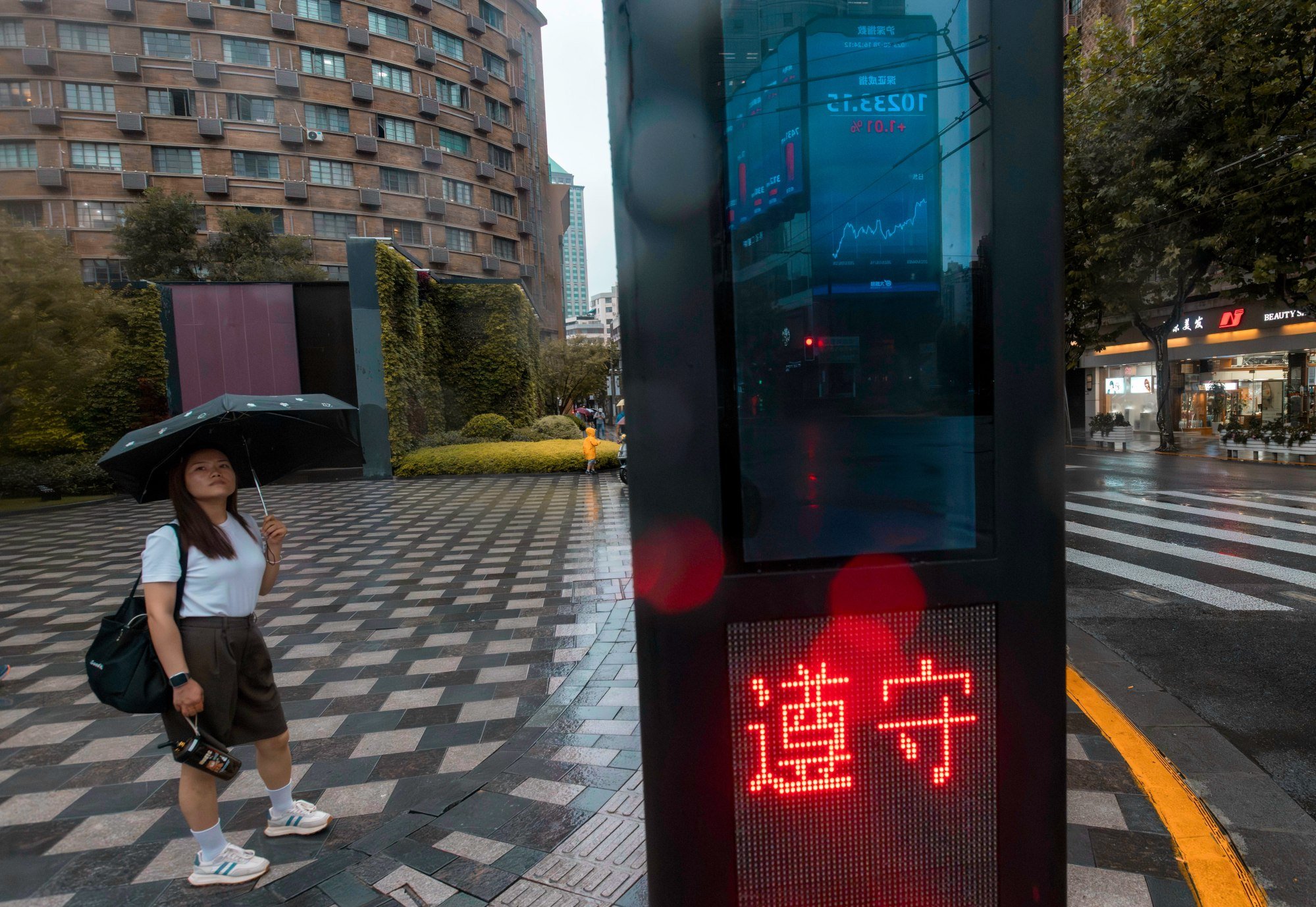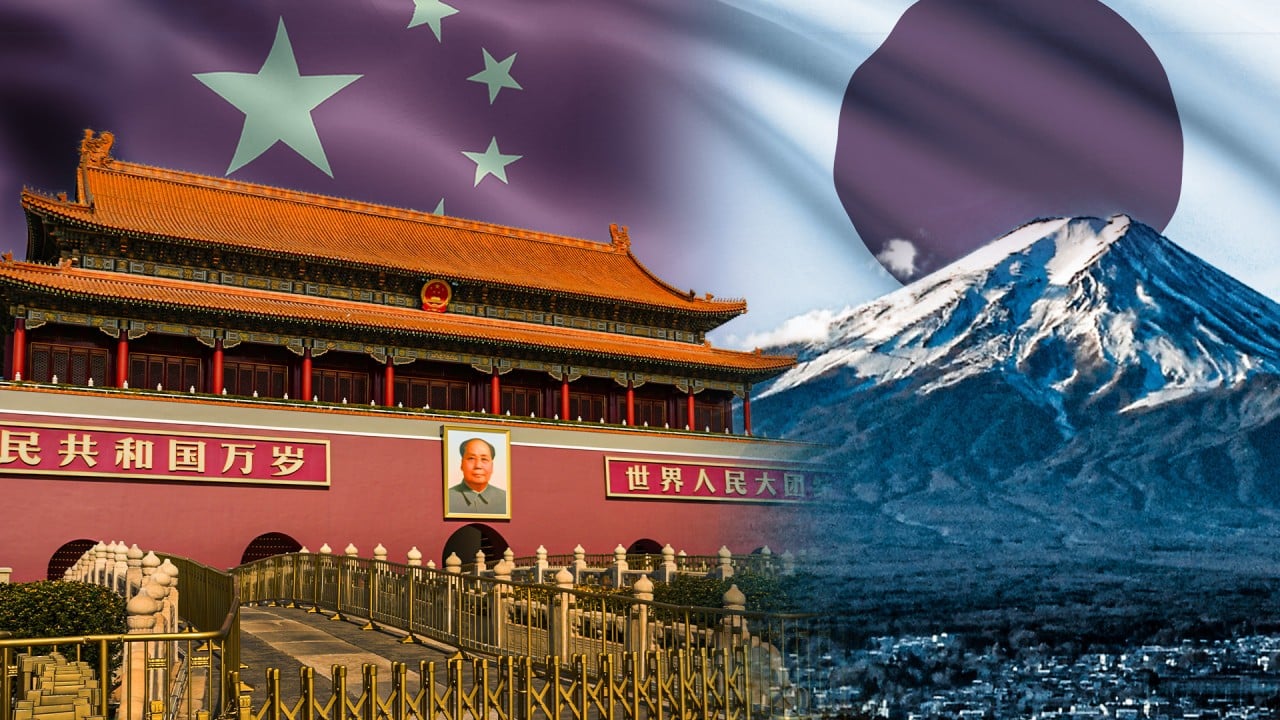
Advertisement
Sentiment has been shaky for some months, as expectations of a strong post-Covid economic recovery failed to materialise and top policymakers refrained from launching a policy “bazooka” to kick-start growth. The term “bazooka” is often used to refer to a large-scale stimulus package, similar to the one Beijing launched during the 2008 global financial crisis.
The government has adopted a more piecemeal approach to economic stimulus. In the latest move, on Thursday, China’s central bank announced a fresh cut to the amount of cash banks must hold as reserves.
The CSI 300 Index of yuan-traded stocks has been mired in a bear market since January 2022, when it was down 20 per cent from a high in February of the previous year.
Advertisement
Advertisement
“China will contribute to roughly one third of global economic growth this year,” she said in an interview. “The absolute scale shows us that China remains a key driver for global growth. In my view, the more certain driver for stock prices will be earnings growth.”
The MSCI China Index, a US$2 trillion benchmark tracking 755 onshore and offshore stocks watched by Cortesi, is trading at 13 times its earnings, compared with the five-year average of 15 times, according to Bloomberg data. The gauge has fallen about 7 per cent this year.
Advertisement
China’s move to bolster sentiment in stocks culminated late on August 27, when the finance ministry announced it would halve the stamp duty payable when shares change hands, the first time the fee has been reduced since 2008. At the same time, the CSRC unveiled rules banning stake reductions by listed companies trading below book value or initial public offering prices, lowered the threshold for participating in margin trading and said it would slow down the pace of new share sales.
The reaction from the market the next day was tepid. The CSI 300 Index closed just 1.2 per cent higher, giving up most of its 5.5 per cent intraday gain. That was a far cry from the excitement 15 years ago, when the levy was last cut; the stock gauge jumped almost by the maximum permissible 10 per cent on April 24, 2008.
For Invesco, a US money manager that oversees US$1.6 trillion of assets, the ramifications of the stamp duty cut should not be judged by the magnitude of the gains in stocks.
Advertisement
Follow-up measures on the cards include extending trading hours, expanding the investment scope of mutual funds and raising the cap on stock investments by banks’ vast pools – estimated at 10 trillion yuan (US$1.37 trillion) – of wealth-management products, he said.
This month, the CSRC published guidelines aimed at revitalising the Beijing Stock Exchange, China’s youngest and smallest bourse. The watchdog is calling for higher-quality listings and the addition of more market makers to provide liquidity.
Some of the recent bolstering measures have even come at the cost of the market-based reforms that have been implemented so far.
The CSRC’s new administrative control over the pace of fresh share offerings is a setback for the registration system for IPOs, a mechanism that was introduced in February to let market forces determine pricing and demand. The order will throw into limbo the fate of Swiss agrichemical giant Syngenta Group’s 65 billion yuan flotation on the Shanghai exchange, which could become the world’s biggest IPO this year.
Still, none of this is proving to be enough to address the concerns of overseas investors that sold a record US$12 billion of Chinese stocks via the exchange link scheme with Hong Kong last month.
“We increasingly believe that the ‘big bazooka’ is not coming,” he said in a report dated August 28. “The Chinese leadership is trying to evolve its economy away from significant reliance on the real estate sector and debt for growth. However, we suspect that global investors will not be confident that a centrally planned economy is the best system to effect such a change.”
His view was echoed by Swiss private bank UBP whose senior economist for Asia, Carlos Casanova, said more policy support and a sustainable recovery in earnings are needed for stocks to enjoy a meaningful recovery.
The focus now comes down to China’s beleaguered property market, once a pillar industry that buttressed the nation’s US$18 trillion economy.
In the boldest rescue manoeuvre so far, China has lowered the bar for first-home purchases and cut the down payment requirements and mortgage rates for first-time buyers. The measures are particularly important for first-tier cities such as Beijing and Shanghai that are the barometer of nationwide home sales.
Nomura Holdings is not optimistic, arguing that Beijing still needs to do more to solve the housing crisis. The remaining restrictions on home transactions and land supply, as well as sluggish external demand and weak confidence in the private sector, continue to weigh on potential buyers’ sentiment, it said.
Meanwhile, any pickup in major cities may drain demand in smaller ones, where prices register bigger declines because of excessive supply, according to the Japanese investment bank.
That said, real estate stocks have been riding the policy tailwinds, and not everyone shares Nomura’s gloomy take. The Hang Seng Mainland Properties Index has surged more than 9 per cent in the past four weeks, outpacing the benchmarks both in Hong Kong and mainland China. Among its constituents, Sunac China Holdings jumped by a record 68 per cent on September 6 and Country Garden climbed above US$1 for the first time in three weeks, a level once categorised as a penny stock, after reaching agreements with debtors to extend the payments on some of its bonds.
“The resonance of these policies within the market fabric enhances sentiment, potentially nurturing a more favourable environment for equity markets than the currently downbeat one,” said Redmond Wong, a strategist at Saxo Markets in Hong Kong. “When complemented by lighter market positioning and better-than-feared earnings recently reported by Chinese corporations, the trajectory of the market appears aligned towards an upwards movement.”
UBS Group is even more sanguine, predicting a “turning point” for Chinese stocks after earnings probably bottomed out in the second quarter. The Swiss bank recommends increasing bets on stocks whose businesses are closely linked to the strength of the economy to reflect the package of policy loosening measures, according to Meng Lei, a Shanghai-based strategist at UBS.
For Jia, who until recently had not spent much time agonising over his stock investments, the dilemma remains. The lowering of the transactions duty helped him bank a 5 per cent return so far this year from a portfolio that has a heavy weighting of brokerages that benefited directly, as well as consumer and green-energy stocks.
However, he cannot be certain the downturn is over.
The best he can do is hope the government ramps up its policies to shore up economic growth and, by extension, the stock market.
“The key lies in whether the economic fundamentals will improve,” he said. “The government still has ammunition in reserve.”
Advertisement



